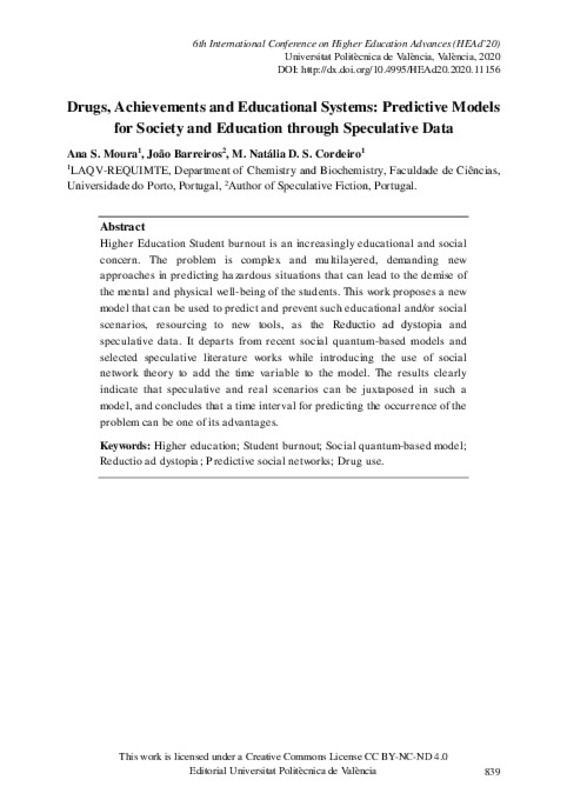JavaScript is disabled for your browser. Some features of this site may not work without it.
Buscar en RiuNet
Listar
Mi cuenta
Estadísticas
Ayuda RiuNet
Admin. UPV
Drugs, Achievements and Educational Systems: Predictive Models for Society and Education through Speculative Data
Mostrar el registro sencillo del ítem
Ficheros en el ítem
| dc.contributor.author | Moura, Ana
|
es_ES |
| dc.contributor.author | Barreiros, João
|
es_ES |
| dc.contributor.author | Cordeiro, M. Natália
|
es_ES |
| dc.date.accessioned | 2020-06-12T07:07:54Z | |
| dc.date.available | 2020-06-12T07:07:54Z | |
| dc.date.issued | 2020-04-30 | |
| dc.identifier.isbn | 9788490488119 | |
| dc.identifier.issn | 2603-5871 | |
| dc.identifier.uri | http://hdl.handle.net/10251/146204 | |
| dc.description.abstract | [EN] Higher Education Student burnout is an increasingly educational and social concern. The problem is complex and multilayered, demanding new approaches in predicting hazardous situations that can lead to the demise of the mental and physical well-being of the students. This work proposes a new model that can be used to predict and prevent such educational and/or social scenarios, resourcing to new tools, as the Reductio ad dystopia and speculative data. It departs from recent social quantum-based models and selected speculative literature works while introducing the use of social network theory to add the time variable to the model. The results clearly indicate that speculative and real scenarios can be juxtaposed in such a model, and concludes that a time interval for predicting the occurrence of the problem can be one of its advantages. | es_ES |
| dc.description.sponsorship | This work had the financial support of Fundação para a Ciência e a Tecnologia (FCT/MEC) through national funds (UIDB/50006/2020 grant and funding into framework of Norma Transitória - DL 57/2016/CP1346/0019). Ana S. Moura further acknowledges contract IF CEECIND/03631/2017. The authors also want to thank the invaluable help of Patrícia C. T. Gonçalves in the development of the graph models. | es_ES |
| dc.language | Inglés | es_ES |
| dc.publisher | Editorial Universitat Politècnica de València | es_ES |
| dc.relation.ispartof | 6th International Conference on Higher Education Advances (HEAd'20) | |
| dc.rights | Reconocimiento - No comercial - Sin obra derivada (by-nc-nd) | es_ES |
| dc.subject | Higher Education | es_ES |
| dc.subject | Learning | es_ES |
| dc.subject | Educational systems | es_ES |
| dc.subject | Teaching | es_ES |
| dc.subject | Student burnout | es_ES |
| dc.subject | Social quantum-based model | es_ES |
| dc.subject | Reductio ad dystopia | es_ES |
| dc.subject | Predictive social networks | es_ES |
| dc.subject | Drug use | es_ES |
| dc.title | Drugs, Achievements and Educational Systems: Predictive Models for Society and Education through Speculative Data | es_ES |
| dc.type | Capítulo de libro | es_ES |
| dc.type | Comunicación en congreso | es_ES |
| dc.identifier.doi | 10.4995/HEAd20.2020.11156 | |
| dc.relation.projectID | info:eu-repo/grantAgreement/FCT//CEECIND%2F03631%2F2017/ | es_ES |
| dc.relation.projectID | info:eu-repo/grantAgreement/FCT//UIDB%2F50006%2F2020/ | es_ES |
| dc.rights.accessRights | Abierto | es_ES |
| dc.description.bibliographicCitation | Moura, A.; Barreiros, J.; Cordeiro, MN. (2020). Drugs, Achievements and Educational Systems: Predictive Models for Society and Education through Speculative Data. En 6th International Conference on Higher Education Advances (HEAd'20). Editorial Universitat Politècnica de València. (30-05-2020):839-846. https://doi.org/10.4995/HEAd20.2020.11156 | es_ES |
| dc.description.accrualMethod | OCS | es_ES |
| dc.relation.conferencename | Sixth International Conference on Higher Education Advances | es_ES |
| dc.relation.conferencedate | Junio 02-05,2020 | es_ES |
| dc.relation.conferenceplace | València, Spain | es_ES |
| dc.relation.publisherversion | http://ocs.editorial.upv.es/index.php/HEAD/HEAd20/paper/view/11156 | es_ES |
| dc.description.upvformatpinicio | 839 | es_ES |
| dc.description.upvformatpfin | 846 | es_ES |
| dc.type.version | info:eu-repo/semantics/publishedVersion | es_ES |
| dc.description.issue | 30-05-2020 | |
| dc.relation.pasarela | OCS\11156 | es_ES |
| dc.contributor.funder | Fundação para a Ciência e a Tecnologia, Portugal | es_ES |








